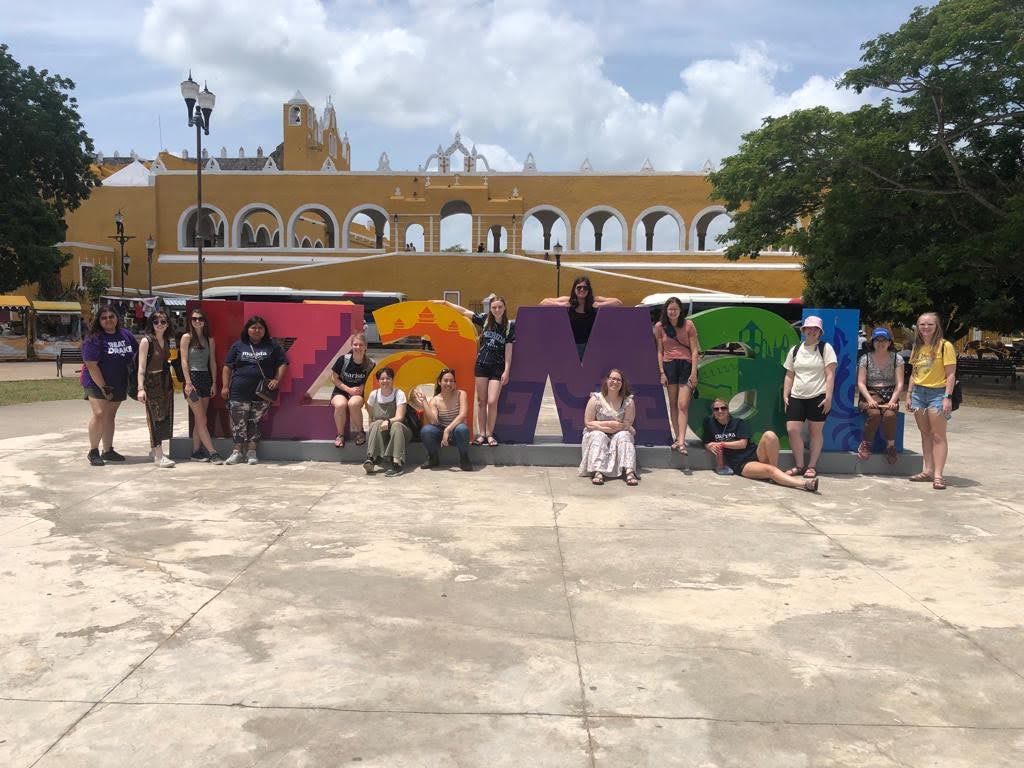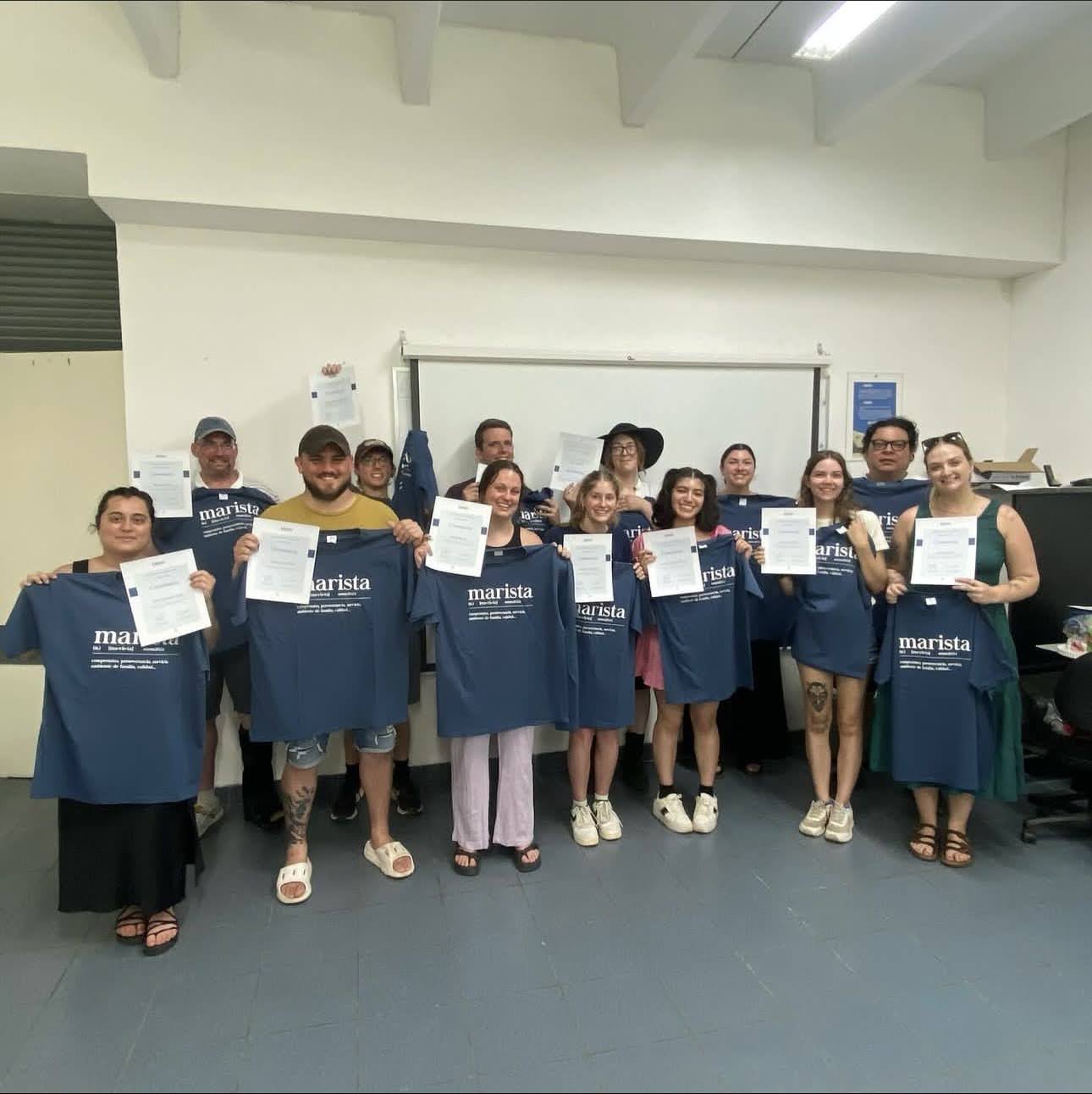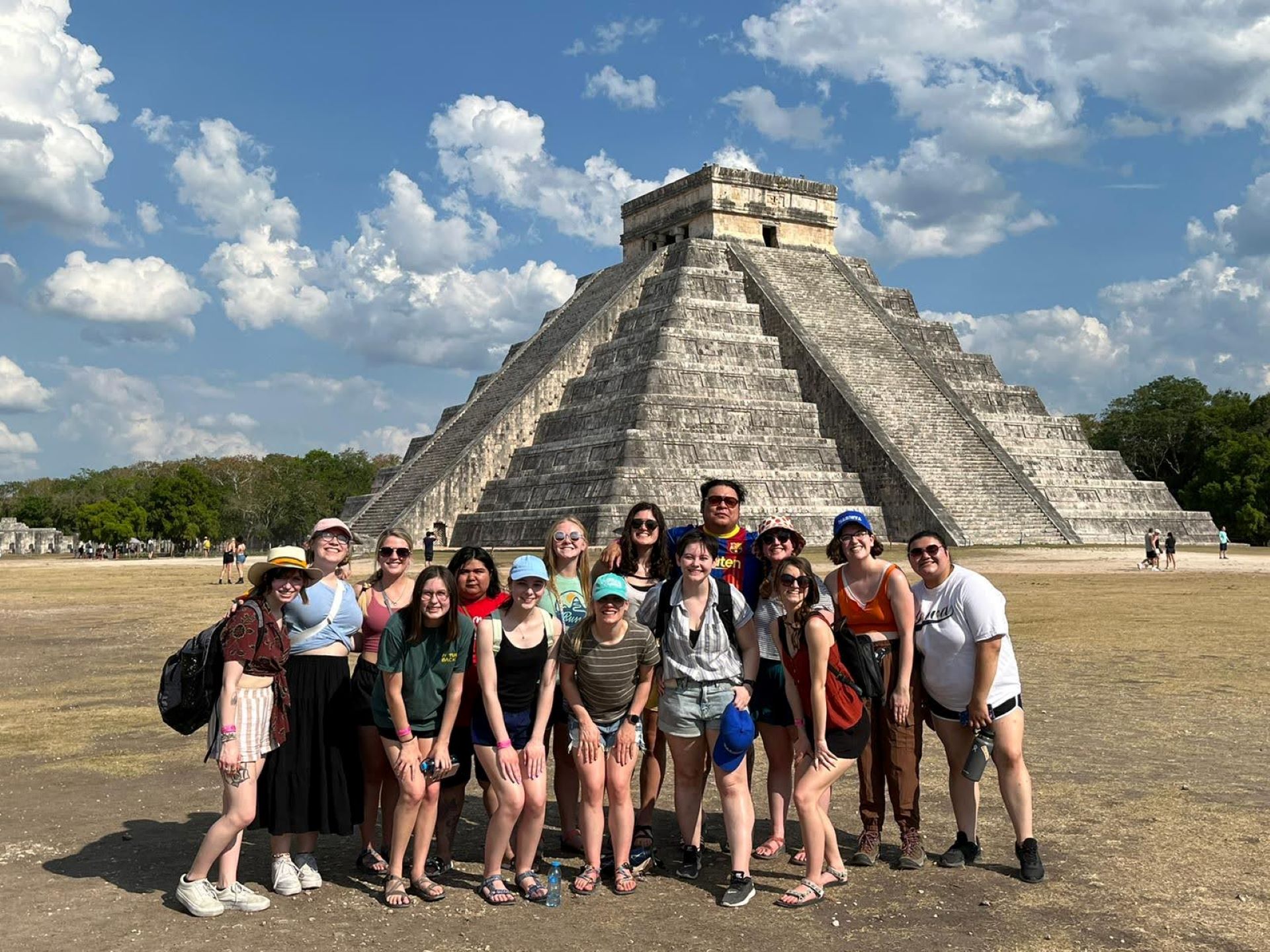Faculty-led Program in Yucatán (Prof. Calderón)
This course exposes students to the history, anthropology, and cultural heritage of Mérida, and the Yucatán in general and includes daily excursions to archeological sites, local museums, ecological reserves, colonial neighborhoods, and several other areas. Since the Spanish conquest, indigenous societies throughout Mexico have faced exploitation, racism, discrimination, forced displacement, and repression at the hands of “democratic” governments, landowners, unfettered capitalism, and the forces of globalization. Yet, their “indigenousness” is repeatedly exploited for political and capitalistic ends by the same state responsible for their marginalization and precarious conditions.
This program was developed in collaboration with the Universidad Marista de Mérida.
I would definitely recommend this trip, this trip! Merida was so full of life, color, and rich history. I loved all of the amazing sites we got to experience, and the Marista students, tour guides, Fernando, and host families made it truly memorable. - Past participant

Dates & Deadlines
App Deadline: December 15, 2024
Program Dates: May 19, 2025 to June 2, 2025 (Dates tentative)
This program is no longer accepting applications. Please review other options or schedule an Info Meeting with our office for help finding a different program that will work well for you!
Interested in studying abroad in the summer of 2025 or later? Please fill out the waitlist form below and the study abroad center will notify you when applications for future terms open. If you are still deciding where or when you want to go abroad, you can also schedule an informational meeting with our office to learn more about the programs we offer and find one that works best for you!
Study Abroad Waitlist Schedule Info Meeting
Unsure where to begin? Visit our Application Process page to learn more!
- Academics
HIST 3279: Conflict and Justice Study Abroad in Mérida, Yucatán - Decolonizing Indigenous History and Social Justice (3 credit hours)
The purpose of this course is twofold: to grasp a more nuanced understanding of Mayan history and how contemporary communities are pushing back against injustices and settler colonialism, and fighting for their right to self-determination. Think of this course as a people’s history of Merida and the Yucatán in which everyone, regardless of status, class, race, ethnicity, or gender, has played a vital role in nation-state building and the preservation of Mayan culture. Moreover, this course aims to get students to think critically, engage in the readings, ask questions, and challenge students to interrogate dominant narratives. In the first half of the course, students will learn about Mayan history, culture, and society by visiting archeological sites, museums, and attending lectures by local experts. Students will also learn about the interconnection between the surrounding environment and the rise and demise of civilizations. Special attention will be placed on how the Maya overcame limited water supply, developed natural resources, and how the changing environment impacted life. In the second half, students will learn about initiatives spearheaded by Mayan descendants, human rights groups, ecotourism, and community organizers to raise awareness about various indigenous issues, protect sacred land, preserve Pre-Columbian languages, and other relevant endeavors.
No prerequisites. All majors welcome. Participation in this program requires several class meetings during the Spring semester, although the course is scheduled as a Summer session course. The Study Abroad Center will enroll participants in the course. Please contact the program's course leader for more information on academic requirements. Course meetings will cover important travel/preparation information as well as academic content to help with the project you will complete abroad.
This is a UNIFI: Human Condition Global category course. It can count as a general education UNIFI elective credit under the category of Connect.
Talk to your academic advisor about how this course would work for you!
NOTES:
- Students planning to participate in the spring commencement ceremony in May can enroll in this summer term program, however, their degree will not be conferred until the end of the summer term and is contingent on the successful completion of the program and all required coursework.
- Students attending colleges and universities other than UNI are welcome to participate in this program. If you are not currently a UNI student, but would like to participate in this program, please contact the UNI Study Abroad Center prior to starting your program application.
- Itinerary
Tentative Program Dates: Monday, May 19 (depart) - Monday, June 2 (return), 2025.
Sample itinerary is subject to change.
Day 1: Students Arrival to Mérida, host families pick up.
Day 2: Welcome and activities with students/ Cooking Class/ City Tour / Carnavalito/ Explore Downtown.
Day 3: Trip to Chichén Itzá, dinner with host families.
Day 4: Lecture/ Gran Museo Maya, dinner with host families.
Day 5: Ek Balam and Valladolid, dinner with host families.
Day 6: Ruta de los Cenotes, dinner with host families.
Day 7: Free day to explore Mérida.
Day 8: Uxmal and Chocolate Museum, dinner with host families.
Day 9: Sustainable Farm, dinner with host families.
Day 10: Hacienda Sotuta, dinner with host families.
Day 11: Progreso-Corchito, dinner with host families.
Day 12: Lecture on Mayan Civilization/ Visit human rights organization, dinner with host families.
Day 13: Izamal, dinner with host families.
Day 14: Free day.
Day 15: Departure.
- Participant Info
Meet your Advisor:
Stephanie is a full time study abroad advisor who will help you throughout the application process to the Yucatán, including documentation, finances, scholarships, and more. From your first steps meeting until you take off for your new adventure, Stephanie will help you every step of the way.
Important information to review:
Study abroad is a once-in-a-lifetime opportunity to be challenged by new experiences in new environments and cultures. UNI study abroad programs are designed to prioritize educational opportunities for students. Students are encouraged to embrace the adventure of exploring how housing, meals, and daily routines differ abroad.
Entry and Exit Requirements
Review and follow the travel recommendations of the U.S. State Department for travel to the Yucatán.

- Housing & Meals
Students will stay in host families. Two meals per day are built into the cost of the program. Remaining meals will be paid for by students out-of-pocket while abroad. Students are encouraged to try the local foods!
Program Costs
Estimated Program Cost: $5,278*
*estimated total cost of participation, actual amount depends on type of housing accommodation selected, actual airfare purchase price, personal spending habits, and other factors
| Estimated Total Program Cost | $5,278 |
| Estimated U-bill Charges | $3,684 |
| Estimated Out-of-Pocket Costs | $1,594 |
Cost of Studying On Campus at UNI*
*per semester, estimated, will vary per person
| Tuition & Fees | $4,864 |
| Room & Board | $4,824 |
| Books | $400 |
| Personal Expenses | $887 |
| Transportation | $350 |
| Total | $11,325 |
Eligibility Requirements to Study Abroad
The Study Abroad Center reserves the right to determine participants' eligibility to study abroad. Students must have a completed study abroad application, including supportive recommendation form(s). Additionally, students must meet all of the following in order to be eligible to study abroad:
- Have a cumulative 2.5 GPA or higher at the time of application and maintain this cumulative GPA prior to departure and throughout the study abroad process
- If your cumulative GPA is lower than 2.5, submit the following to the Study Abroad Center (103 East Bartlett):
- Letters of reference from two academic contacts (e.g. academic advisor and former or current professor) supporting your pursuit of study abroad. If you are attending a faculty-led study abroad program, one of the letters must be from a course leader. However, if the program has two course leaders, only one of the letters can be from one of the course leaders.
- Must be over the age of 18 years old
- Must meet the course prerequisites (participation in the program is dependent upon meeting these)
- Must be in good standing with the university
- UNI's partner institutions may require additional eligibility requirements to be met, these vary from institution to institution. Please consult with the Study Abroad Center staff to discuss these additional requirements, if applicable.
- Applicants traveling to a region of a country or a country with an overall Travel Advisory Level 3 (Reconsider Travel) or 4 (Do Not Travel) will not be eligible.

